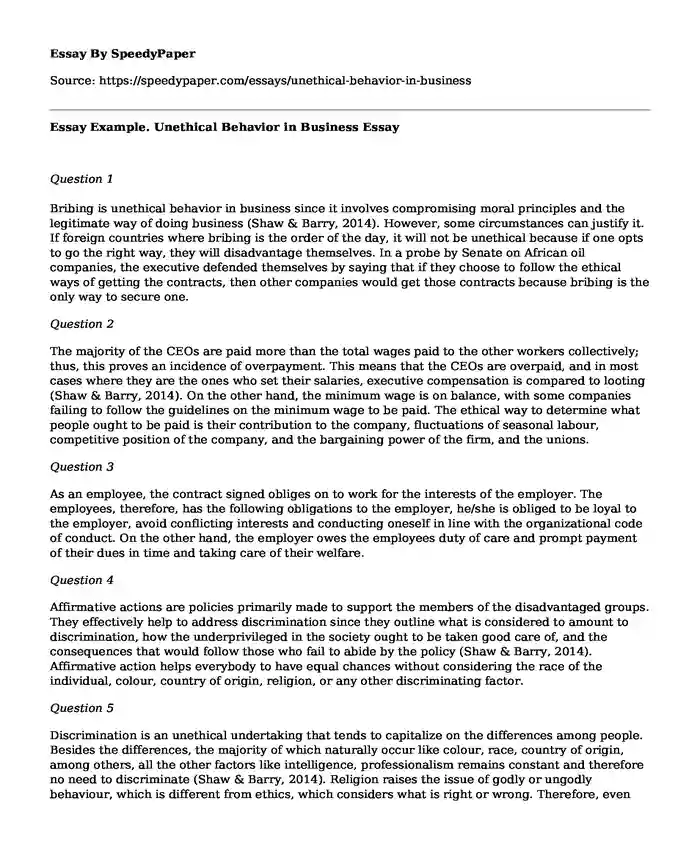
| Type of paper: | Course work |
| Categories: | Human resources Money Business ethics Minimum wage |
| Pages: | 3 |
| Wordcount: | 691 words |
Question 1
Bribing is unethical behavior in business since it involves compromising moral principles and the legitimate way of doing business (Shaw & Barry, 2014). However, some circumstances can justify it. If foreign countries where bribing is the order of the day, it will not be unethical because if one opts to go the right way, they will disadvantage themselves. In a probe by Senate on African oil companies, the executive defended themselves by saying that if they choose to follow the ethical ways of getting the contracts, then other companies would get those contracts because bribing is the only way to secure one.
Question 2
The majority of the CEOs are paid more than the total wages paid to the other workers collectively; thus, this proves an incidence of overpayment. This means that the CEOs are overpaid, and in most cases where they are the ones who set their salaries, executive compensation is compared to looting (Shaw & Barry, 2014). On the other hand, the minimum wage is on balance, with some companies failing to follow the guidelines on the minimum wage to be paid. The ethical way to determine what people ought to be paid is their contribution to the company, fluctuations of seasonal labour, competitive position of the company, and the bargaining power of the firm, and the unions.
Question 3
As an employee, the contract signed obliges on to work for the interests of the employer. The employees, therefore, has the following obligations to the employer, he/she is obliged to be loyal to the employer, avoid conflicting interests and conducting oneself in line with the organizational code of conduct. On the other hand, the employer owes the employees duty of care and prompt payment of their dues in time and taking care of their welfare.
Question 4
Affirmative actions are policies primarily made to support the members of the disadvantaged groups. They effectively help to address discrimination since they outline what is considered to amount to discrimination, how the underprivileged in the society ought to be taken good care of, and the consequences that would follow those who fail to abide by the policy (Shaw & Barry, 2014). Affirmative action helps everybody to have equal chances without considering the race of the individual, colour, country of origin, religion, or any other discriminating factor.
Question 5
Discrimination is an unethical undertaking that tends to capitalize on the differences among people. Besides the differences, the majority of which naturally occur like colour, race, country of origin, among others, all the other factors like intelligence, professionalism remains constant and therefore no need to discriminate (Shaw & Barry, 2014). Religion raises the issue of godly or ungodly behaviour, which is different from ethics, which considers what is right or wrong. Therefore, even when the religion perpetuates discrimination, it is unethical.
Question 6
The above discussion provides insights into the key issues that affect business and general life at large. To start with, the question of compensation of both the CEOs and the other employees in an important aspect that ought to be addressed. Over the years, the gap between the salaries paid to those in executive positions and those underneath has continued to burgeon. This discrepancy, as a result, has resulted in a reduced motivated workforce, which eventually leads t a high rate of turnover. Also, the shareholders do not benefit much on the profits made since much of it goes to payments of the senior executive compensation.
The second issue of interest is discrimination. The differences between people in terms of colour, race, origin, gender, or religion should not determine the level of preference in the workplace (Shaw & Barry, 2014). The government has played its role in the formation of affirmative action policies that would help to solve this menace, thus promoting equality in diversity. In the career, this issue of discrimination will be resolved by ensuring all people are given equal chances to compete and thus awarding merit. Lastly, discrimination should not be justified by the religious affiliation of the member. Religion rather should be the uniting factor and significant opposition to discrimination.
Reference
Shaw, W., & Barry, V. (2014). Moral Issues in Business (13th ed.). Cengage Learning: Boston.
Cite this page
Essay Example. Unethical Behavior in Business. (2023, Feb 22). Retrieved from https://speedypaper.com/essays/unethical-behavior-in-business
Request Removal
If you are the original author of this essay and no longer wish to have it published on the SpeedyPaper website, please click below to request its removal:
- Free Essay Containing a Business Idea - Water Bottles That Have Filters
- Free Essay on the Role of Imagination and Speculation in Media and Technology Development
- Case Study of the Treatment for Victims of Domestic Violence
- Free Essay on Authoritarian/Autocratic/Directive Leadership Style
- Essay Sample about Brian Skerry: Education and Photographic Training
- Essay Example on History of Community Colleges
- Paper Example: Rules of Jurisdiction
Popular categories




